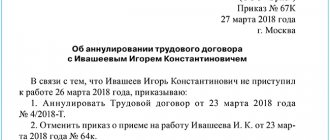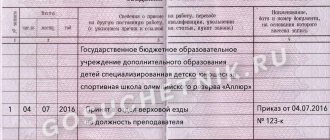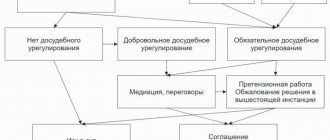Basic provisions
The primary authority for resolving disputes between an employee and an employer is the Labor Dispute Commission (LCC). If the commission’s decision is not made within 10 days from the date of filing the application, or if you want to challenge the decision, it is lawful to take the case to court. The composition of the commission is determined by the employer in accordance with Article 384 of the Labor Code of the Russian Federation. Employee representatives may be appointed by the union or elected at a general meeting.
According to labor and civil procedural legislation (in particular, the Labor Code of the Russian Federation and Federal Law No. 79 “On the State Civil Service of the Russian Federation” dated July 27, 2004), such claims are considered by district courts of general jurisdiction. Based on the Supreme Court Ruling No. 19-KG12-5 dated July 20, 2012, the labor inspectorate does not resolve disagreements, but has the right to issue an order to immediately take measures to eliminate obvious violations of the law.
Legal offers professional protection of business interests when considering individual labor disputes in court.
Documents applicable to labor dispute settlement cases:
- Labor Code of the Russian Federation and regulations, which include generally accepted principles and norms of labor law;
- Legal act of local significance;
- Collective agreements;
- Employment contract, including amendments.
Who can apply:
- A legal or natural person whose rights have been violated in the opinion of the plaintiff;
- Prosecutor;
- Unions;
- Bodies of state power, territorial self-government;
- Collegial bodies of the system for the prevention of neglect and juvenile delinquency;
- Guardianship and trusteeship authorities;
- Third-party formations whose task is to protect the rights, freedoms and legitimate interests of citizens in accordance with Articles 21 and 391 of the Labor Code, Article 4, Part 1, Article 45 and Art. 46 part 1 of the Code of Civil Procedure of the Russian Federation.
Deadlines for filing claims:
- 10 days from the date of receipt of the decision of the CCC in case of disagreement;
- 1 month for resolving issues of termination of working relationships, counted from the date of issuing a copy of the dismissal order or issuing the work book;
- 3 months from the date when the victim received information about the violation of legal rights;
- 1 year (from the date of the established deadline for payment of wages, payments due by law upon dismissal) - the period during which an employee can go to court to resolve an individual labor dispute about non-payment or incomplete payment of wages and other payments due to the employee;
- 1 year (from the date of discovery of the damage caused by the employee to the employer) to resolve a dispute regarding compensation for damage by the employee to the employer.
The statute of limitations for labor disputes can be restored only if there are compelling reasons supported by documents:
- The plaintiff is on a business trip;
- Undergoing treatment;
- The need to care for an incapacitated family member;
- Inability to submit an application to the court due to force majeure;
- An employee's appeal in violation of the rules of jurisdiction to another court, if the initial application on the said dispute was filed by this employee in accordance with Art. 392 TC term.
Please note that the presence of a confirmed disability is not a basis for extending the deadline for filing a claim within the period provided for by law. The limitation period does not apply to claims for compensation for harm caused to the life or health of a citizen. However, claims brought after three years from the moment the right to compensation for such damage arose are satisfied for the past time no more than 3 years preceding the filing of the claim (except for cases provided for by Federal Law of March 6, 2006 N 35-FZ).
Control over the execution of court decisions rests with bailiffs.
Still have questions?
Fill out the form and our expert will contact you!
What is jurisdiction
The Code of Civil Procedure of the Russian Federation gives every citizen the right to apply to the judicial authorities for protection. Before seeking help in resolving labor disputes, it is necessary to understand the provisions of the Code of Civil Procedure. First you need to find out what the jurisdiction of a labor dispute is. Jurisdiction presupposes the authority to try cases in a court of a particular instance, taking into account:
- types of legal industry (labor, housing, family, etc.);
- the cost of the claim (the amount of claims made against the defendant);
- territories of residence of the plaintiff and defendant;
- area for filing a complaint.
The choice of the authority to address any dispute may depend on one or more of the above criteria. The procedure for determining jurisdiction is specified in the APC and the Code of Civil Procedure. A claim filed with violations will not be considered. You should know that arbitration courts are not subject to consideration of personal labor disputes, so workers should pay more attention to the Civil Procedure Code rather than to the APC. So, general rules:
- the conflict can be resolved in a court that has jurisdiction over the cases in accordance with the location of the defendant (the defendant in labor disputes will be the employer’s organization) or where the branch subordinate to the company is located;
- The first instance for most cases will be the magistrate's or district court.
These are general rules, however, there is also exclusive jurisdiction, but since it has nothing to do with labor disputes, this topic will not be discussed in this article. If you are interested, our lawyers who provide free consultations on the site. I would like to immediately note that it is necessary to complain against the employer to the district court, unless otherwise specified in the employment contract. Magistrates do not have the authority to hear such cases.
Possible causes of action
As an example, let’s look at the most common grounds for applying to the courts regarding the settlement of professional relations:
- Inconsistency between the terms of the employment agreement and the work process;
- Change of work schedule, including reduction of days off and regular vacation;
- Violation of payment deadlines or salary amounts;
- Transfer to another place Prof. activities;
- Wrongful convictions, disciplinary sanctions;
- Inaction (or illegal actions) of the employer in the processing and protection of personal data;
- Reinstatement, regardless of the reason for dismissal;
- Disagreement with the formulation of the reason for the termination of the prof. agreements;
- Causing damage to the employer's property;
- Refusal to provide an applicant with a vacant job, etc.
Bodies for settlement of collective labor disputes
The legislation establishes bodies that can resolve disputes arising from labor proceedings, these include:
- State Labor Inspectorate in the Sverdlovsk Region . The parties turn to the service when the internal rules for resolving a collective labor dispute have been exhausted. The service identifies the causes of disputes and also looks for a way to resolve them, organizes conciliation procedures, offers various solutions to disputes and their possible settlement;
- Labor arbitration (formed independently between the parties, only with the involvement of the labor and employment service; in this case, a composition of arbitrators is formed who will study documents and investigate the collective labor dispute, identify the facts, the decision made by the arbitrators is binding). Labor arbitration can be organized only after a conciliation commission has been held and a mediator has been invited, but this has not yielded any result;
- Conciliation commissions (formed at enterprises consisting of several people to resolve a collective dispute); The composition of the commission is formalized directly by order at the enterprise; during conciliation procedures between the parties (employee and employer), a protocol is kept during the case. The decision between the parties can be one, either an agreement on the dispute between them is reached or not. In case of a negative decision, the parties may subsequently contact the service to resolve conflicts;
- Mediation (in this situation, the body that resolves the labor dispute is a mediator hired by the parties. The mediator is a specialist in resolving collective disputes. The mediator can be invited after a conciliation commission has been organized and held; the mediator will consider the dispute only on the basis of the drawn up protocol).
- Prosecutor's office
Labor disputes procedure and terms of consideration in court
In terms of the procedure for their consideration, labor disputes are not much different from ordinary civil cases, and they are considered in the usual manner according to their jurisdiction. The main stages of analyzing these processes are given below:
- After filing a petition and collecting the necessary documents, the plaintiff submits them to the office of the court district either with a personal visit or by registered mail with return notification. If for some reason the plaintiff makes a mistake in choosing territorial jurisdiction, the authority may not return the claim to him, but independently forward it to the competent judicial authority, of which the applicant will be immediately notified.
- The judge reviews the papers presented to him and sets a date for the first hearing, of which all parties to the process are notified in writing.
- Based on the results of the hearings regarding the filed claim, the authority issues its verdict, the text of which may contain information about its full or partial satisfaction, or about leaving it without consideration. Proceedings in the case can take place either in the presence of the parties or their legal representatives acting by proxy, or in the absence of one of them in the courtroom, but in this case the parties will not be able to present their arguments that could influence the decision of the judicial authority.
- The court decision is prepared for release within 3 days and handed over to the parties to the process.
- Once the resolutions are in the possession of the employer and employee, there is an appeal period during which each has the right to appeal the decision to a higher court.
- If no appeals are received, the decision acquires its legal force, and if the plaintiff wins, he is given a writ of execution that helps him ensure recovery from the defendant, both independently and with the help of bailiffs.
Important! The time period allotted for the court to consider the claim is regulated by Article 154 of the Code of Civil Procedure of the Russian Federation. Thus, the text of this section contains information that all general cases are considered within 2 months, after which a decision must follow, and another 10 to 15 days are allotted for appeal
However, there are labor disputes that cannot be delayed, for example, regarding reinstatement after unauthorized dismissal, and this conflict must be resolved exceptionally within 1 month.
Where to write depending on the situation
In addition to the rules for contacting judicial authorities upon fact:
- registration of the defendant;
- the plaintiff's residence;
- location of subsidiaries;
There is also situational jurisdiction. This means that the choice of court occurs according to their authority. After all, some materials cannot be considered by the magistrate court, but only by the district court and vice versa. As a rule, at least a district or magistrate court is located in a certain territory to resolve conflict situations. At the same time, the difference compared to territorial distribution is that the plaintiff is deprived of freedom of choice. (that is, if his situation requires the case to be heard in the district court, that is where he should go).
In the case of disputes between an employer and an employee, the magistrate can only issue an order regarding non-payment of already accrued funds:
- if the salary is accrued but not issued to the employee;
- if vacation pay is accrued but not given to the employee;
- if the dismissal payment is accrued but not issued to the employee;
- if compensation for the delay of money from the employer is accrued but not paid;
- any other funds have been accrued to employees but not paid.
For all other issues regarding labor disputes (some of them were noted above in the text), you can only contact district judicial authorities (or city ones, depending on the territorial structure of the settlement). In cities of federal significance (Moscow, Sevastopol and St. Petersburg), the jurisdiction of the courts only includes verification of already adopted court decisions.









